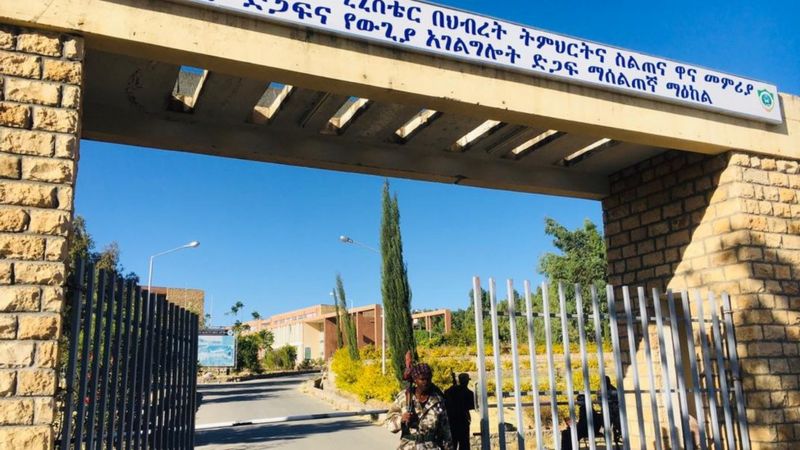Ethiopia’s Prime Minister Abiy Ahmed has ordered a military offensive, after an army base was taken over by forces loyal to the regional government of Tigray.
Mr Abiy accused the region’s ruling party, the Tigray People’s Liberation Front (TPLF), of launching the attack.
The attack resulted in “many martyrs, injuries and property damage”, he said in a TV address.
The cabinet has declared a state of emergency in the region for six months.
The national authorities have also shut down electricity, telephone and internet services in Tigray.
Tensions between the government and TPLF, which used to be part of the governing coalition before falling out with Mr Abiy, have escalated in recent months, with both sides accusing the other of plotting to use military force.
On Tuesday, the federal parliament proposed that the TPLF be designated as a “terrorist organization.”
What did Mr Abiy say?
Mr Abiy said that attackers “tried to loot” military assets during Wednesday morning’s attack, adding that “the last red line had been crossed” forcing the federal government into a military confrontation.
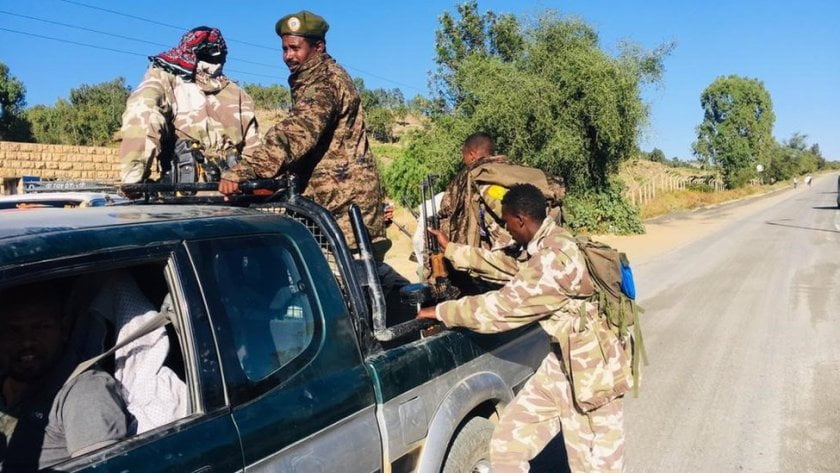
Mr Abiy’s office also accused the TPLF of dressing its soldiers in uniforms resembling those of the army of neighbouring Eritrea to “implicate the Eritrean government in false claims of aggression against the people of Tigray”.
“The national defence force that has been in the bunkers for the past 20 plus years defending its people and the country by paying heavy sacrifices with its blood and flesh, has been attacked, this evening in Mekelle and many other places, by traitors and the force they organised,” Mr Abiy said in a TV address.
“The army has been attacked from behind by its own citizens and many have been martyred, wounded and properties destroyed,” he added.
Details of the attack could not be immediately verified.
What’s happening in Tigray?
The BBC has spoken to eyewitnesses who have confirmed that the Northern Command Headquarters in Tigray’s regional capital, Mekelle, is under the control of regional forces.
BBC Tigrinya’s Girmay Gebru reports that sounds of gunfire could be heard early on Wednesday morning but calm has since returned.
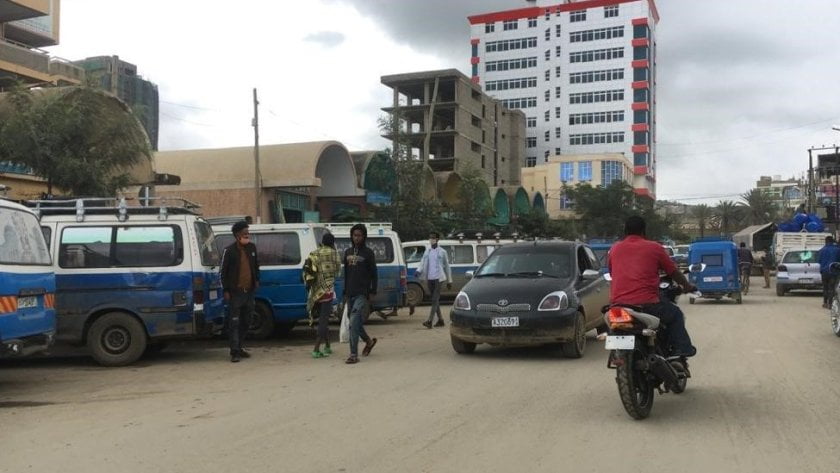
People were walking around the city but passenger vehicles are not operating because local authorities have imposed restrictions on movement and they have also closed the airspace, our reporter adds.
Banks and the only local office of state-owned Ethio Telecom – the country’s only mobile phone company – have been closed. The national carrier Ethiopian Airlines has also stopped flights to the region.
It’s unclear how the federal government will implement the state of emergency it has declared because regional leaders are in charge, our reporter says, adding that Tigray forces have been deployed to the border it shares with Amhara region.
What have the Tigray authorities said?
A local official has claimed that federal forces deployed to the region had defected but this has not been confirmed.
Last week Tigray leaders blocked a general appointed by Mr Abiy from assuming a new posting, saying he no longer had the authority to make such moves.
“We will never be the first to shoot nor the first to blink,” Getachew Reda, a senior member of the TPLF, told AFP last week.
On Tuesday night, hours before Mr Abiy’s announcement, Wondimu Asamnew, another senior Tigrayan official, told AFP the federal government was amassing troops on the southern border of Tigray – a claim that could not be independently verified.
“I think when it comes to military mobilisation, it’s not child’s play. It can trigger all-out war… what they are doing is playing with fire… a small spark can ignite the whole region. So I think we are on the alert and I can assure you we are capable of defending ourselves,” Mr Wondimu said.

Tigray has well-armed security forces
By Desta Gebremedhin, BBC Tigrinya
The threat of an armed conflict between the federal government and the authorities in Tigray has been brewing for some time, so the current escalation has not come as a surprise to many Ethiopians.
Mr Abiy seems to have lost patience with the Tigray leaders who he sees as undermining his authority since he took office in 2018. Critics, however, accuse the prime minister of excluding TPLF officials in his reformist plans – some say his purge of the region’s leaders has contributed to the current crisis.
His close relationship with Eritrea’s President Isaias Afwerki, considered a foe in Tigray, has also contributed to the bad blood.
Mr Abiy has said the mission of the federal troops in Tigray is “to save the country and region from instability”.
His challenge is that Tigray, like other regions in Ethiopia, has its own well-trained and armed special police forces and militia, so any potential conflict could be costly for both sides.
The fear is that any escalation in Tigray could spill over to the rest of Ethiopia and neighbouring countries.
__________________________________________________________________________________________
Source: Bloomberg
Ethiopian Army Plans Further Strikes in Restive Tigray Region
Simon Marks and Samuel Gebre(Bloomberg) — Ethiopia prepared for a second day of clashes in the restive Tigray region as the United Nations and the U.S. urged the two sides to step back from a conflict that risks erupting into a full-blown civil war.
The military engaged with forces loyal to the Tigray People’s Liberation Front in three areas on Wednesday and more operations are planned in the coming days, Prime Minister Abiy Ahmed said in a televised addressed. The Ethiopian Human Rights Commission urged lawmakers who are meeting Thursday to approve a state of emergency in Tigray to ensure humanitarian access to the region.
“The commission is gravely concerned and closely monitoring the fast-developing security situation in Tigray and other parts of the country,” it said in a statement. “EHRC urges both federal and regional security forces to ensure the safety and security of civilians.”
There was no immediate word on the number of casualties in the conflict, which erupted on Wednesday after Abiy accused the TPLF of orchestrating a raid on a federal army camp. Relations between the national and regional governments have deteriorated since Abiy took office in 2018 and sidelined the TPLF, once the pre-eminent power broker in Ethiopia.
The fighting has unnerved investors. Yields on Ethiopia’s Eurobonds due 2024 jumped 64 basis points to 6.89% in London on Wednesday, the biggest increase in six months.
United Nations Secretary-General Antonio Guterres and the U.S. urged both sides to de-escalate tensions.
“We are saddened by the tragic loss of life and urge immediate action to restore the peace,” the State Department said in a statement on its website.
_____________________________________________________________________________
Ethiopian tension ropes in neighbours concerned with another war
Thursday, November 05, 2020, Senior Diplomatic Writer
Ethiopia will be chairing this month’s African Union Peace and Security Council, the continental body charged with maintaining tranquillity, even as Prime Minister Abiy Ahmed ordered a military response to Tigray after the region “crossed the last red line.”
And Ethiopia’s position in the region, and the continent, means analysts in the Horn of Africa are worried any snowball from the tension between Addis Ababa and Tigray region could be devastating to peace efforts elsewhere.
Dr Abiy’s government on Wednesday also imposed a six-month state of emergency in the northern Tigray region, accusing the local administration of threatening the sovereignty of Ethiopia.
Ambushed Ethiopian forces
Dispatches from the Prime Minister’s Office in Addis Ababa claimed the Tigrayan People’s Liberation Front (TPLF) had ambushed Ethiopian forces at a camp in Tigray and “attempted to rob” artillery from the facility.
“The attack on the Northern Command (of ENDF) has been premised on TPLF viewing the Ethiopian National Defence Forces as a foreign army rather than an army that has been protecting the people of Tigray for more than twenty years.
“Resultantly, TPLF has chosen to wage war in Dalshah,” the PM’s Office said, referring to the ENDF base in Tigray.”
Although no new fighting had been reported by Wednesday evening, analysts think Ethiopia is too important to implode now.
“The conflict brewing in Ethiopia has the potential to spill over to the region; the immediate Horn of Africa neighbours,” Abdimalik Abdullahi, a Horn of Africa Researcher said.
Embrace dialogue
“Both PM Abiy and Tigray ought to heed the voices of reason and embrace national dialogue. Sobriety and maximum restraint should reign or Ethiopia will go to the dogs.”
Ethiopia, the seat of the African Union, is seen as an alternative safety haven for refugees fleeing neighbouring countries with Kenya and Uganda taking a significant share of refugees too.
“Any increase in violence would foreshadow further regional destabilisation and humanitarian disaster. We call upon all parties to resolve tensions through dialogue and to take all appropriate measures to end military action,” Jan Egeland, the Secretary-General of the Norwegian Refugee Council said last evening.
Ethiopia has about 1.82 million people internally displaced across the country and hosts another 790,000 refugees from other conflicts in the East Africa region.
“Humanitarian needs are high and resources to meet them scarce, especially during the (Covid-19) pandemic. Prime Minister Abiy Ahmed, the 2019 Nobel Peace Prize recipient, must manage this crisis carefully and be steadfast in preventing the humanitarian situation from deteriorating further,” Egeland added.
Peace bids
Last year, Addis Ababa was involved in peace bids in neighbouring Sudan, South Sudan and restored diplomatic relations with Eritrea. But some observers think Tigray is now a common problem for both Ethiopia and Eritrea, given the ethnic composition.
“PM Abiy would not have ordered the army to go on the offensive in Tigray without Isaias Afewerki’s active connivance and instigation. A short, sharp campaign to dislodge TPLF as two hope wide off the mark,” Rashid Abdi who analyses geopolitical issues in the Horn and the Gulf region said, referring to the Eritrean President.
“Tigray now a volatile theatre likely to draw in Eritrea, reignite border conflict.”
Elections
In August, Tigray defied Abiy’s postponement of national elections to next year, citing Covid-19. Tigrayans who held their local polls have argued they do not recognise him. Addis Ababa in turn cut budgetary allocation for Tigray.
Tsedale Lemma, an Ethiopian political analyst said the Tigray situation is the by-product of Premier Abiy’s failed political project.
“The price tag for this transactional political order keeps skyrocketing; what started by jailing formidable opponents of Abiy’s failed nation building project has now morphed into a civil war to get rid of TPLF, a powerful opponent, once-for-all using the military,” she argued.
“But make no mistake, this isn’t ‘a surgical operation’ which will quickly end TPLF, but an epistemic rupture of the Federation as we know it. When it’s over, and regardless of its outcome, Abiy’s failed ambition of a nation building project will be irreparably dented.”
Banned flights
And In a statement Wednesday, TPLF banned any type of flights across the Tigray regional Airspace.
It also warned against any military movement near its borders and threatened to take action against any forces that attempt to cross the regional borders.
It said the federal forces that were stationed in Tigray have abandoned central government and decided to stand with Tigray in a struggle to remove the PM Abiy-led “unconstitutional government”.
It further called on all federal forces to abandon the central government and join the TPLF-led struggle
Access to telephone and internet in Tigray is blocked.
Although the council of ministers declared a six-month state of emergency in Tigray, it is not clear how the federal government, which is not in control of the region, will implement the decree.
Whether it was wise for Tigray to defy authorities in Addis may yet to be seen. The Ethiopian federal system has often followed ethnic lines, with each of the ten regions named and composed of major tribes in the country.
Yet it, sort of, held together the country. In December 2019, Dr Abiy led the dissolution of the coalition, Ethiopian People’s Revolutionary Democratic Front and merged parties into the Prosperity Party. The TPLF which had been part of the coalition refused to dissolve.
Over ambitious
Some experts, however, think Tigrayans have been over ambitious.
“Ethiopian PM’s order to the army to tame rogue Tigrayan region is wise and timely. Misguided Tigrayan elites thumbed their noses at the very Ethiopianness PM Abiy was pushing for,” Dr Abdiwahab Sheikh Abdisamad of Nairobi’s think-tank Southlink Consultants told the Nation, arguing Ethiopia should crush them once or regret later.
Tigrayans have also bickered with Amhara, the neighbouring autonomous region.
“They want to govern the country by force, because they have everything. They are one of the best equipped autonomous regions of Ethiopia, militarily. But their way of doing things will undermine the stability of Ethiopia and the entire region,” Dr Abdisamad added.
_____________________________________________________________________________
Ethiopia Near Civil War as PM Sends Army Into Defiant Region
By Associated PressNovember 04, 2020 05:23 PM
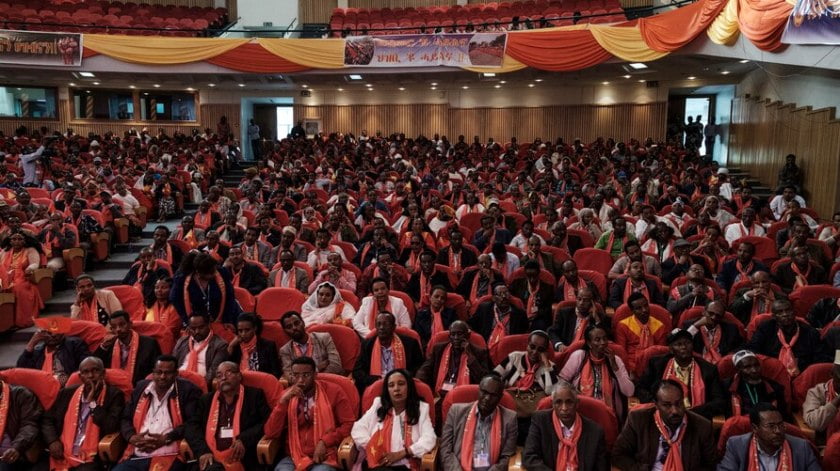
ADDIS ABABA, ETHIOPIA – Ethiopia approached civil war Wednesday as its Nobel Peace Prize-winning prime minister ordered the military to confront the country’s well-armed Tigray regional government, accusing it of a deadly attack on a military base and declaring “the last red line has been crossed” after months of alleged provocations.
Prime Minister Abiy Ahmed’s move against the Tigray People’s Liberation Front, in one of Africa’s most populous and powerful countries, sent a shock wave through the long-turbulent Horn of Africa. Ethiopia’s neighbors include Somalia and Sudan, and the prospect of spreading instability sent a chill down observers’ spines.

Signaling the gravity of the threat, the United States in the midst of its election drama issued a statement urging “an immediate de-escalation.” The United Nations expressed “alarm” and made a similar plea.
“We have to guard against ‘just another tribal African war,’ ” former U.S. diplomat Payton Knopf told The Associated Press. “This is much more akin to what an interstate war would look like,” with large and highly trained ground forces, mechanized units and heavy artillery.
Internet and phone lines were cut in Tigray, challenging efforts to verify the Ethiopian government’s account of events. A statement on Tigray TV accused the federal government of deploying troops to “cow the people of Tigray into submission by force” and said airspace over the region was closed.
The prime minister announced “several martyrs” in the overnight attack in Mekele, the northern Tigray region’s capital, and Dansha town. The region is Ethiopia’s most sensitive, neighboring Eritrea, which fought a long border war before the two countries made peace in 2018.
Counterattack
Abiy, in a national address late Wednesday, said the attack was aimed at making Ethiopia vulnerable to outside enemies, without naming names. The army late Wednesday said it had launched a counterattack and asserted “massive” damage, and Abiy said the military would conduct further operations in the coming days.
Ethiopia declared a six-month state of emergency in Tigray on Wednesday, saying “illegal and violent activities” were threatening the country’s sovereignty. A Tigray TV report that the Ethiopian military’s northern command had defected to the Tigray government was “not true,” the prime minister’s office told the AP.
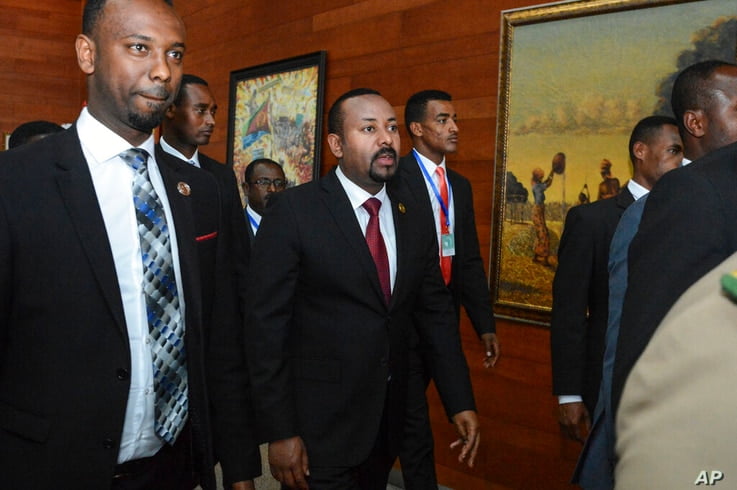
The TPLF dominated Ethiopia’s military and governing coalition before Abiy took office in 2018 and announced sweeping political reforms that won him the Nobel last year. Those reforms, however, opened space for ethnic and other grievances. The TPLF, feeling marginalized by shifts in power, left the coalition last year.
Tigray officials have objected to the postponement of Ethiopia’s national election because of the COVID-19 pandemic, which extends Abiy’s stay in office. In September, the region held an election that defied the federal government and increased tensions over a region of some 5 million people that, despite its small share of Ethiopia’s population of 110 million, has had outsize influence.
Last month, the federal government further angered the TPLF by moving to divert funding for Tigray to local administrations instead of the regional government.
On Monday, Tigray leader Debretsion Gebremichael warned that a bloody conflict could erupt, accusing Ethiopian and Eritrean leaders of making “all necessary preparations to start war” against the region. There was no immediate Eritrea comment.
Ethiopia was already stressed by a dispute with Egypt over a massive Ethiopian dam project that has drawn rare attention from President Donald Trump to Africa, and by a multilayer crisis with the COVID-19 pandemic and deadly ethnic violence.
‘Disastrous’ conflict feared
“This war is the worst possible outcome of the tensions that have been brewing,” said William Davison, the International Crisis Group’s senior analyst for Ethiopia. “Given Tigray’s relatively strong security position, the conflict may well be protracted and disastrous.”
Abiy’s statement accused the TPLF of arming and organizing irregular militias in recent weeks. “TPLF has chosen to wage war,” his office said. “The last red line has been crossed with this morning’s attacks and the federal government is therefore forced into a military confrontation” to save the country.
The TPLF has said it’s not interested in negotiating with the federal government. “What we need now is a national dialogue,” a senior TPLF official, Getachew Reda, told the AP on Sunday.
Observers have worried for months about the growing tensions and their implications for the Horn of Africa, where Abiy has cast himself as a peacemaker.
A report last month by the U.S. Institute of Peace said the fragmentation of Ethiopia “would be the largest state collapse in modern history, likely leading to mass interethnic and interreligious conflict … and a humanitarian and security crisis at the crossroads of Africa and the Middle East on a scale that would overshadow the existing conflicts in South Sudan, Sudan, Somalia and Yemen.”
The international community needs to rally around the idea of national dialogue in Ethiopia, the International Crisis Group wrote last week. “The alternative, given the country’s multiple and bitter divides, is a potential march to war that would be catastrophic,” it said.


